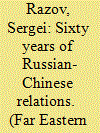| Srl | Item |
| 1 |
ID:
141640


|
|
|
|
|
| Summary/Abstract |
Party identification is central to the study of American political behavior, yet there remains disagreement over whether it is largely instrumental or expressive in nature. We draw on social identity theory to develop the expressive model and conduct four studies to compare it to an instrumental explanation of campaign involvement. We find strong support for the expressive model: a multi-item partisan identity scale better accounts for campaign activity than a strong stance on subjectively important policy issues, the strength of ideological self-placement, or a measure of ideological identity. A series of experiments underscore the power of partisan identity to generate action-oriented emotions that drive campaign activity. Strongly identified partisans feel angrier than weaker partisans when threatened with electoral loss and more positive when reassured of victory. In contrast, those who hold a strong and ideologically consistent position on issues are no more aroused emotionally than others by party threats or reassurances. In addition, threat and reassurance to the party's status arouse greater anger and enthusiasm among partisans than does a threatened loss or victory on central policy issues. Our findings underscore the power of an expressive partisan identity to drive campaign involvement and generate strong emotional reactions to ongoing campaign events.
|
|
|
|
|
|
|
|
|
|
|
|
|
|
|
|
| 2 |
ID:
093633


|
|
|
|
|
| Publication |
2009.
|
| Summary/Abstract |
Russia and China mark the 60th anniversary of the establishment of diplomatic relations between them, which have traversed a tortuous path during these decades - from allied closeness based on ideological identity and bloc solidarity, then hostility and even brinkmanship on the verge of military action to strategic partnership and interaction within the framework of the relations of a new type.
Our present relations - the best in their entire history - are based on common interests, common concerns and mutual support on principal problems. But they do not envisage the formation of a military-political alliance, are not aimed against third countries and represent a viable structure. Its formation was of a stage-by-stage character. In 1992 the two sides confirmed the need to regard themselves as friendly countries. In 1994 it was decided to establish the relations of constructive partnership, and in 1996 - equal trust-based relations of partnership aimed at strategic interaction in the 21st century. In 2001 the basic political Treaty was signed - On Good-Neighborliness, Friendship and Cooperation, which sealed the relations of strategic partnership and interaction.
Such character of relations between the two biggest neighboring countries seems quite natural today, but at that time it was actually a notable event in politics which became a subject of close attention and analysis by many authoritative researchers. I'd like to express some of my own views emphasizing the sixty-year experience and lessons of our relations with the PRC.
|
|
|
|
|
|
|
|
|
|
|
|
|
|
|
|